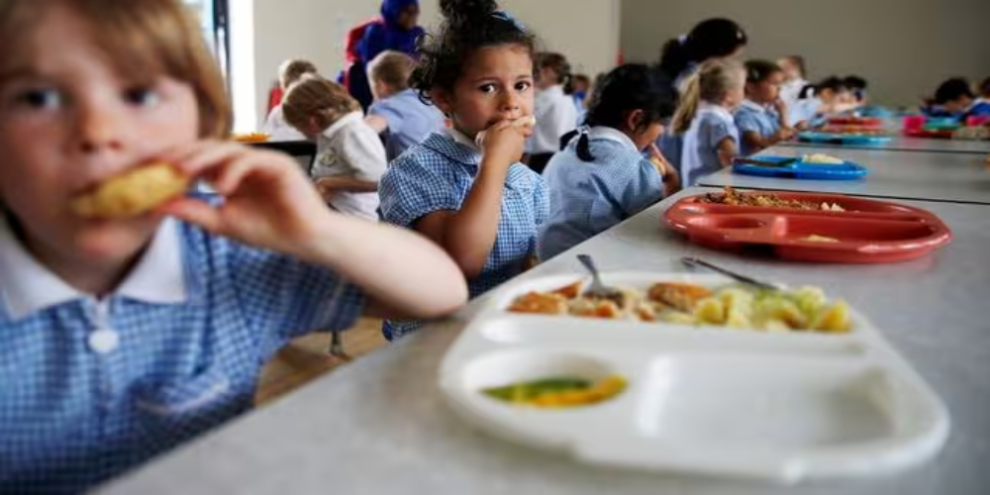A report by The Food Foundation think tank has revealed that nearly four million children in the UK experienced food poverty in January this year. This comes as the demand for expanding free school meals to pupils is rising in the country amid a cost-of-living crisis
Nearly 4 million children in the United Kingdom experience food poverty, new data has revealed.
As per London-based The Food Foundation think tank, the number of households living with food insecurity has almost doubled in the past year.
This comes amid growing calls in the UK to provide free school meals to children of families battling the cost-of-living crisis and soaring inflation.
What is food poverty and what has the new survey found? Let’s understand.
Public Health Scotland defines food poverty or food insecurity as “the inability to acquire or consume an adequate or sufficient quantity of food in socially acceptable ways, or the uncertainty that one will be able to do so”.
According to UNICEF, child food poverty is when kids under five years of age are deprived of the minimum diverse diet they need during the early childhood years to develop to their “full potential”.
The Food Foundation report released on Wednesday (1 March) says that 21.6 per cent of households in the UK said their children experienced food insecurity in January this year.
This shows that food poverty has increased as compared to last January when 11.6 per cent of households had reported skipping meals or going hungry for a day.
A separate polling by The Food Foundation has found that eight out of 10 people (80 per cent) surveyed in England voted in favour of expanding the provision of free school meals to all children in households receiving Universal Credit, an increase from 72 per cent in October.
Universal Credit is a financial aid for low-income or out of work people in the UK.
As many as 82 per cent of people in South West Surrey and 81 per cent in the Stockton South seat in the north-east of England support extending free school meals to all children, as per The Guardian.
Anna Taylor, executive director of The Food Foundation, said that this latest data exposes the government’s safety net.
“We have been tracking these trends for some time, the levels of food insecurity among children continue to be terribly concerning, and point to big holes in the Government’s safety net,” Taylor told Grocery Gazette.
“These latest findings now show the public is overwhelmingly in favour of greater government support for the millions of families suffering the worst effects of the cost-of-living crisis.”
Around 8,00,000 children living in poverty in England do not qualify for free school meals. As per The Guardian, households must have an annual income of under £7,400 before benefits and after tax to be eligible for the scheme.
This limit has not changed since 2018, despite a rise in prices.
Currently, grocery inflation in the UK is at 17.1 per cent, the highest ever on record.
Last month, London’s mayor, Sadiq Khan, announced that from September all primary school children in the capital would be provided free meals for a year.
The Guardian noted that free school lunches would save parents about £440 a child per year.
The London boroughs of Islington, Newham, Westminster, Southwark and Tower Hamlets, already provide free school meals for all primary school children.
Wales aims to offer free lunches for primary pupils by 2024 and Scotland is also rolling out a similar policy, as per The Guardian.
In Northern Ireland, the income threshold for Universal Credit is twice that of England, noted Grocery Gazette.
“By extending free school meals to more children in England in the next budget, the government could deliver a policy change that is popular with voters, targeted and timely, and truly delivers on levelling up,” Taylor was quoted as saying by Grocery Gazette.
A Department for Education spokesperson told The Guardian, “Since 2010 the number of children receiving a free meal at school has increased by more than two million, increasing the number of pupils who benefit from free school meals in education settings from just one in six, to over one third.
“On top of this, we have made a further investment in the national school breakfast programme to extend the programme for another year, backed by up to £30m,” the spokesperson added.
Last month, health groups in the UK had called on Prime Minister Rishi Sunak to scrap the £7,400 eligibility criteria so that children of all families receiving universal credit can be entitled to free lunch at school.
This Thursday (2 March), over a thousand charities urged Sunak to provide surplus food to struggling families.
In a letter written by FareShare – network of charitable food redistributors in the UK – and signed by 1,020 charities, the organisation said: “FareShare has calculated that by committing £25 million per year the government could deliver 42,500 tonnes of surplus food – the equivalent of 100 million meals – to those experiencing food insecurity”,
Source : First Post











